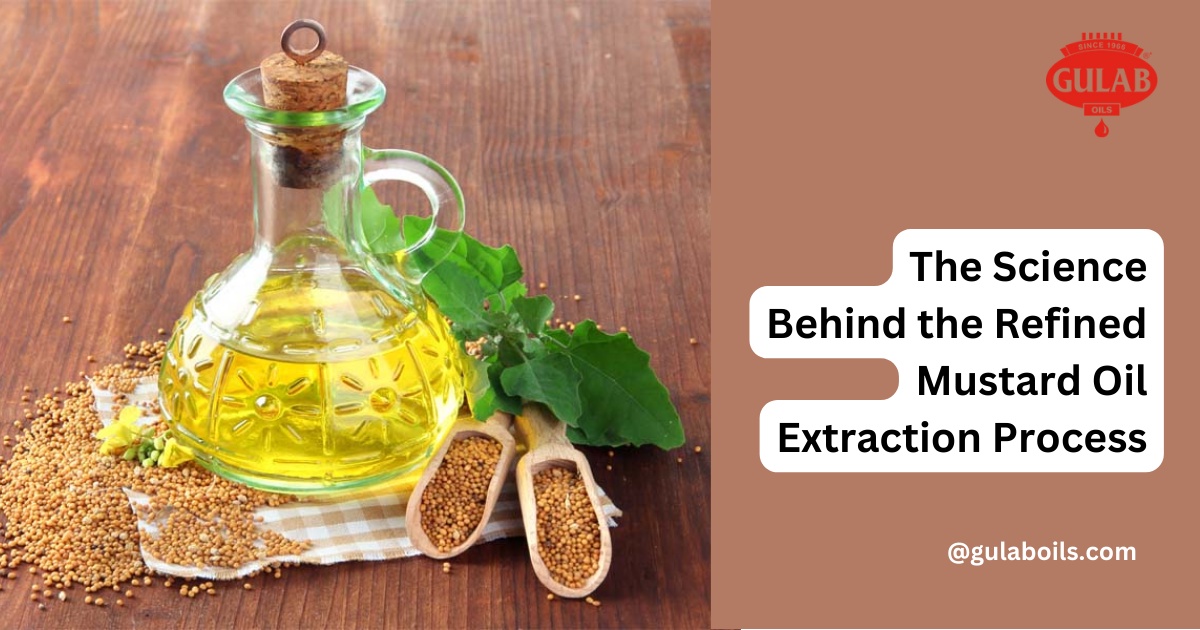The growing buzz around healthy cooking oils and their role in a balanced lifestyle makes consumers think twice before purchasing. This blog is one contributor to increasing consumer knowledge. We all recognize the intense flavor and unique aroma of refined mustard oil, which has carved out a unique space in kitchens worldwide. So, sharing this type of knowledge with consumers is more valuable in making an informed choice about the products they use. Let us begin with such details for all those already consuming or considering switching to this oil.
Extraction is a multistep process that aims to clean the oil for impurities and enhance its quality. After extraction, mustard oil undergoes refining to improve its quality and make it suitable for consumption. This process also preserves its nutritional value and contributes to increased shelf life. Let us begin by learning about the chemical composition of mustard seeds, followed by the extraction process.
Also read out: High-Oleic vs. Regular Sunflower Oil: Which One is Right for You?
Chemical Composition of Mustard Seeds
- Mustard seeds have a complex composition with a unique arrangement of fatty acids, including oleic acid, linoleic acid and erucic acid. The health advantages and culinary adaptability of mustard oil can be determined through its precise fatty acid composition.
- The sulfur-containing compounds, called glucosinolates, bring out mustard oil's pungency taste and characteristic aroma. The oil hydrolysis through enzymes forms isothiocyanates, a significant compound associated with the spicy flavor and benefits.
- Besides the fatty acid components, mustard oil provides many benefits through its proteins, carbohydrates, vitamin E, calcium, magnesium, potassium, and even dietary fiber. These components have beneficial antioxidant properties, anti-inflammatory effects, and cardiovascular safeguarding functions.
- Knowledge of the chemical components is crucial to spreading awareness to the consumer and food technologists, who further research and design products. These components are health-promoting compounds and influence flavor, aroma and nutritional content.·
Refined Mustard Oil Extraction Process
The multi-stage refining process of mustard oil eliminates impurities and enhances the oil's overall characteristics. Here are the detailed steps-
-
Cleaning and Sorting
Dust, dirt, stones and foreign particles are removed by simple cleaning and sorting. This method confirms that high-quality seeds are used for oil extraction, thus minimizing contamination risk.
-
Crushing and Grinding
After cleaning, the seeds are crushed and ground to form a paste. This ground form has more surface area, allowing easy oil release during extraction. Crushing also helps break down the seeds' cellular structure, enabling efficient oil extraction.
-
Pressing or Extraction
Crushed mustard seeds are mechanically pressed—cold pressing extracts oil using high pressure for pressing or extraction. The mechanically ground seeds or crushed seeds yield oil without heat. Cold pressing is better than hot pressing due to the excellent retention of the oil's flavor, aroma, and nutritional components.
-
Filtering
After extraction, mustard oil needs further clarification to remove remaining solid material, unwanted elements, and moisture. Filtration through cloth or paper helps capture these unwanted materials. This will leave the oil clear without visible grit.
-
Degumming
Natural gums, phospholipids and other minor impurities are removed through degumming, which is essential for improving stability and quality. The oil is treated with water or acid to remove the gums. A precipitate is formed, which is further centrifuged or filtered for removal.
-
Neutralization
Mustard oil may contain free fatty acids during the extraction process, contributing to its acidity and rancidity. This step of neutralization is essential for removing unwanted acidity from oil. Sodium hydroxide alkali helps treat the oil, which turns the present acids into soap. The soapy mixture can then be removed through simple washing. The clean oil thus obtained is a neutral oil with better stability.
-
Bleaching
Bleaching involves the removal of remaining pigments, trace metals and odorous compounds. Mixing bleaching earth or activated carbon and heating this mixture under a vacuum helps easy impurity adsorption. This step is followed by filtration, which removes the adsorbent to obtain a clear, colorless product.
-
Deodorization
The final refining stage is deodorization, which removes the oil's off-flavors and odors. Oil is treated under a vacuum to a specific temperature so that these volatile compounds evaporate and are removed. The refined oil, thus obtained, has a light flavor and aroma that does not overpower the dish's flavor.
Nutritional Value and Health Benefits of Refined Mustard Oil
- After refining, the nutritional value and health benefits need to be analyzed. Food companies also use these facts and information to provide clear information on their labels. Moreover, it empowers consumers to choose the oil that satisfies their needs.
- For incorporating more monounsaturated and polyunsaturated fats into your diet, this oil is a delicious way to support heart health. This is due to their role in raising high-density lipoprotein and lowering LDL or low-density lipoprotein, commonly known as bad cholesterol.
- The antioxidant Vitamin E protects against cell damage.·
- Another essential reason this oil is a popular choice in many cuisines is its high smoke point, making it a staple.
Conclusion
The refining process applied to mustard oil is an essential step for removing impurities and quality improvisation. The process involves cleaning the sourced seeds and crushing them to obtain crude oil, which is further filtered and deodorized. Each subsequent step leaves a clear, colorless oil with a mild flavor and aroma. The refined mustard oil contains many nutritious qualities, providing many health advantages due to the healthy fatty acids, protein and mineral content. Exploring refined oil's procedure and chemical composition makes us more familiar with versatile cooking and its qualities for our daily usage.


No comments yet